International Relations: US Foreign Policy and Global Terrorism
VerifiedAdded on 2023/06/10
|8
|1890
|331
Report
AI Summary
This report provides an analysis of US foreign policy and its impact on international relations, focusing on the global war on terrorism (GWOT) and related conflicts. It examines Jeffrey Record's arguments against the GWOT, particularly the conflation of threats and the strategic errors of the Iraq War. The report also discusses Michael Slackman's observations on the Iraq War and its repercussions, including Iran's involvement. Furthermore, it explores Thomas Barnett's perspective on the shifting definition of global threats and the US strategy in the post-Cold War era. Finally, the report analyzes the Israel-Hezbollah War, drawing lessons about conflict objectives and strategies, highlighting parallels with the US-Al Qaeda conflict. The report uses several references to support its arguments and provides a comprehensive overview of the complexities of international relations in the context of US foreign policy and global terrorism.
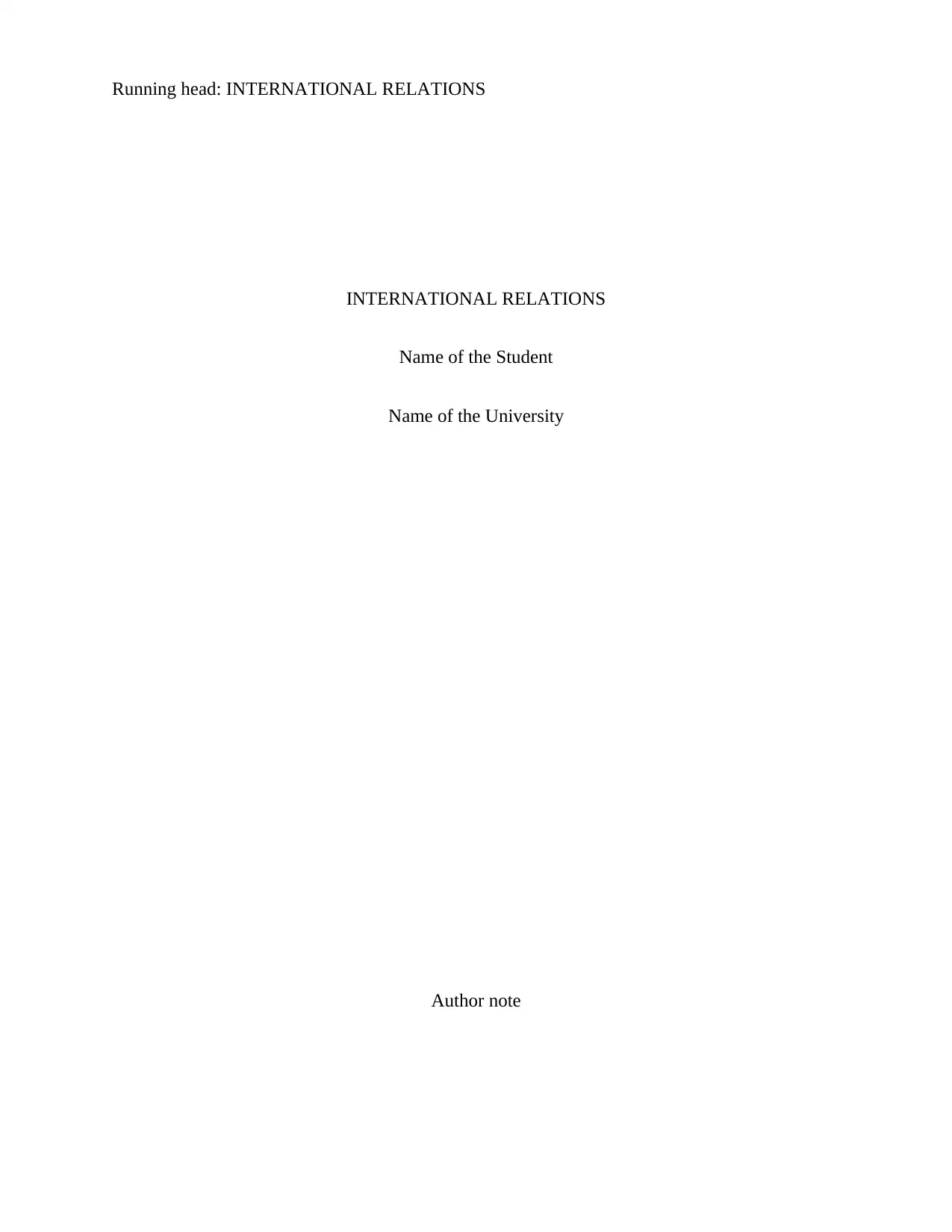
Running head: INTERNATIONAL RELATIONS
INTERNATIONAL RELATIONS
Name of the Student
Name of the University
Author note
INTERNATIONAL RELATIONS
Name of the Student
Name of the University
Author note
Paraphrase This Document
Need a fresh take? Get an instant paraphrase of this document with our AI Paraphraser
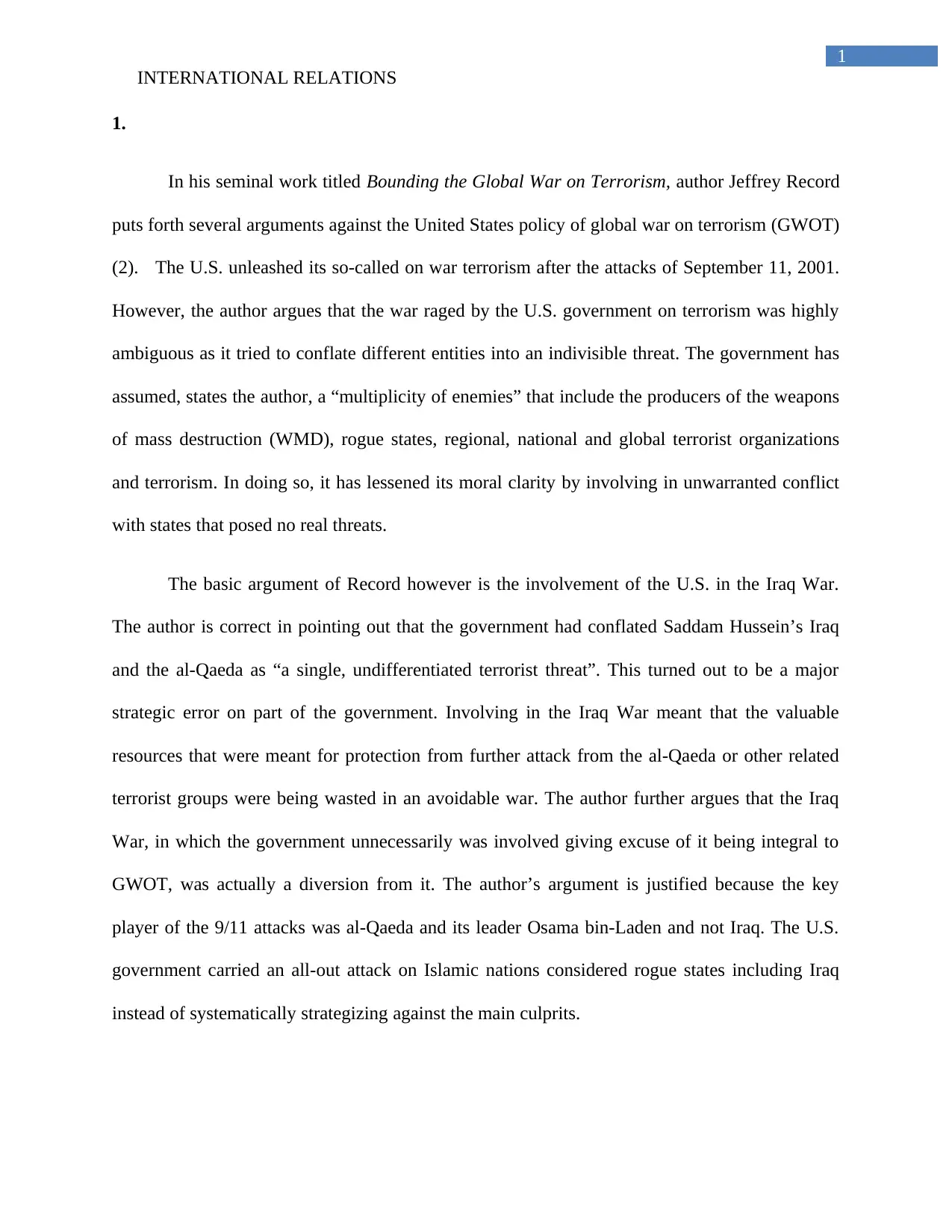
1
INTERNATIONAL RELATIONS
1.
In his seminal work titled Bounding the Global War on Terrorism, author Jeffrey Record
puts forth several arguments against the United States policy of global war on terrorism (GWOT)
(2). The U.S. unleashed its so-called on war terrorism after the attacks of September 11, 2001.
However, the author argues that the war raged by the U.S. government on terrorism was highly
ambiguous as it tried to conflate different entities into an indivisible threat. The government has
assumed, states the author, a “multiplicity of enemies” that include the producers of the weapons
of mass destruction (WMD), rogue states, regional, national and global terrorist organizations
and terrorism. In doing so, it has lessened its moral clarity by involving in unwarranted conflict
with states that posed no real threats.
The basic argument of Record however is the involvement of the U.S. in the Iraq War.
The author is correct in pointing out that the government had conflated Saddam Hussein’s Iraq
and the al-Qaeda as “a single, undifferentiated terrorist threat”. This turned out to be a major
strategic error on part of the government. Involving in the Iraq War meant that the valuable
resources that were meant for protection from further attack from the al-Qaeda or other related
terrorist groups were being wasted in an avoidable war. The author further argues that the Iraq
War, in which the government unnecessarily was involved giving excuse of it being integral to
GWOT, was actually a diversion from it. The author’s argument is justified because the key
player of the 9/11 attacks was al-Qaeda and its leader Osama bin-Laden and not Iraq. The U.S.
government carried an all-out attack on Islamic nations considered rogue states including Iraq
instead of systematically strategizing against the main culprits.
INTERNATIONAL RELATIONS
1.
In his seminal work titled Bounding the Global War on Terrorism, author Jeffrey Record
puts forth several arguments against the United States policy of global war on terrorism (GWOT)
(2). The U.S. unleashed its so-called on war terrorism after the attacks of September 11, 2001.
However, the author argues that the war raged by the U.S. government on terrorism was highly
ambiguous as it tried to conflate different entities into an indivisible threat. The government has
assumed, states the author, a “multiplicity of enemies” that include the producers of the weapons
of mass destruction (WMD), rogue states, regional, national and global terrorist organizations
and terrorism. In doing so, it has lessened its moral clarity by involving in unwarranted conflict
with states that posed no real threats.
The basic argument of Record however is the involvement of the U.S. in the Iraq War.
The author is correct in pointing out that the government had conflated Saddam Hussein’s Iraq
and the al-Qaeda as “a single, undifferentiated terrorist threat”. This turned out to be a major
strategic error on part of the government. Involving in the Iraq War meant that the valuable
resources that were meant for protection from further attack from the al-Qaeda or other related
terrorist groups were being wasted in an avoidable war. The author further argues that the Iraq
War, in which the government unnecessarily was involved giving excuse of it being integral to
GWOT, was actually a diversion from it. The author’s argument is justified because the key
player of the 9/11 attacks was al-Qaeda and its leader Osama bin-Laden and not Iraq. The U.S.
government carried an all-out attack on Islamic nations considered rogue states including Iraq
instead of systematically strategizing against the main culprits.
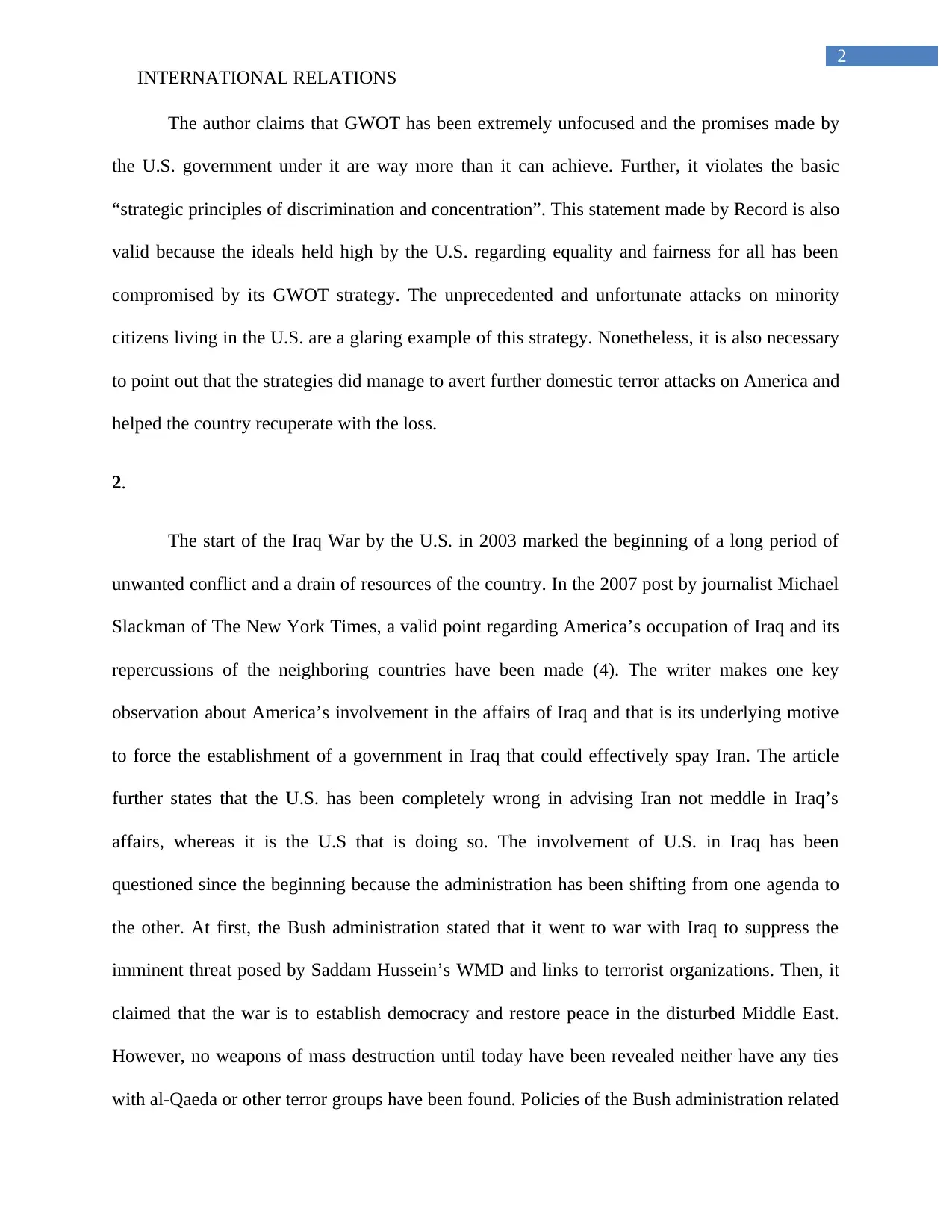
2
INTERNATIONAL RELATIONS
The author claims that GWOT has been extremely unfocused and the promises made by
the U.S. government under it are way more than it can achieve. Further, it violates the basic
“strategic principles of discrimination and concentration”. This statement made by Record is also
valid because the ideals held high by the U.S. regarding equality and fairness for all has been
compromised by its GWOT strategy. The unprecedented and unfortunate attacks on minority
citizens living in the U.S. are a glaring example of this strategy. Nonetheless, it is also necessary
to point out that the strategies did manage to avert further domestic terror attacks on America and
helped the country recuperate with the loss.
2.
The start of the Iraq War by the U.S. in 2003 marked the beginning of a long period of
unwanted conflict and a drain of resources of the country. In the 2007 post by journalist Michael
Slackman of The New York Times, a valid point regarding America’s occupation of Iraq and its
repercussions of the neighboring countries have been made (4). The writer makes one key
observation about America’s involvement in the affairs of Iraq and that is its underlying motive
to force the establishment of a government in Iraq that could effectively spay Iran. The article
further states that the U.S. has been completely wrong in advising Iran not meddle in Iraq’s
affairs, whereas it is the U.S that is doing so. The involvement of U.S. in Iraq has been
questioned since the beginning because the administration has been shifting from one agenda to
the other. At first, the Bush administration stated that it went to war with Iraq to suppress the
imminent threat posed by Saddam Hussein’s WMD and links to terrorist organizations. Then, it
claimed that the war is to establish democracy and restore peace in the disturbed Middle East.
However, no weapons of mass destruction until today have been revealed neither have any ties
with al-Qaeda or other terror groups have been found. Policies of the Bush administration related
INTERNATIONAL RELATIONS
The author claims that GWOT has been extremely unfocused and the promises made by
the U.S. government under it are way more than it can achieve. Further, it violates the basic
“strategic principles of discrimination and concentration”. This statement made by Record is also
valid because the ideals held high by the U.S. regarding equality and fairness for all has been
compromised by its GWOT strategy. The unprecedented and unfortunate attacks on minority
citizens living in the U.S. are a glaring example of this strategy. Nonetheless, it is also necessary
to point out that the strategies did manage to avert further domestic terror attacks on America and
helped the country recuperate with the loss.
2.
The start of the Iraq War by the U.S. in 2003 marked the beginning of a long period of
unwanted conflict and a drain of resources of the country. In the 2007 post by journalist Michael
Slackman of The New York Times, a valid point regarding America’s occupation of Iraq and its
repercussions of the neighboring countries have been made (4). The writer makes one key
observation about America’s involvement in the affairs of Iraq and that is its underlying motive
to force the establishment of a government in Iraq that could effectively spay Iran. The article
further states that the U.S. has been completely wrong in advising Iran not meddle in Iraq’s
affairs, whereas it is the U.S that is doing so. The involvement of U.S. in Iraq has been
questioned since the beginning because the administration has been shifting from one agenda to
the other. At first, the Bush administration stated that it went to war with Iraq to suppress the
imminent threat posed by Saddam Hussein’s WMD and links to terrorist organizations. Then, it
claimed that the war is to establish democracy and restore peace in the disturbed Middle East.
However, no weapons of mass destruction until today have been revealed neither have any ties
with al-Qaeda or other terror groups have been found. Policies of the Bush administration related
⊘ This is a preview!⊘
Do you want full access?
Subscribe today to unlock all pages.

Trusted by 1+ million students worldwide
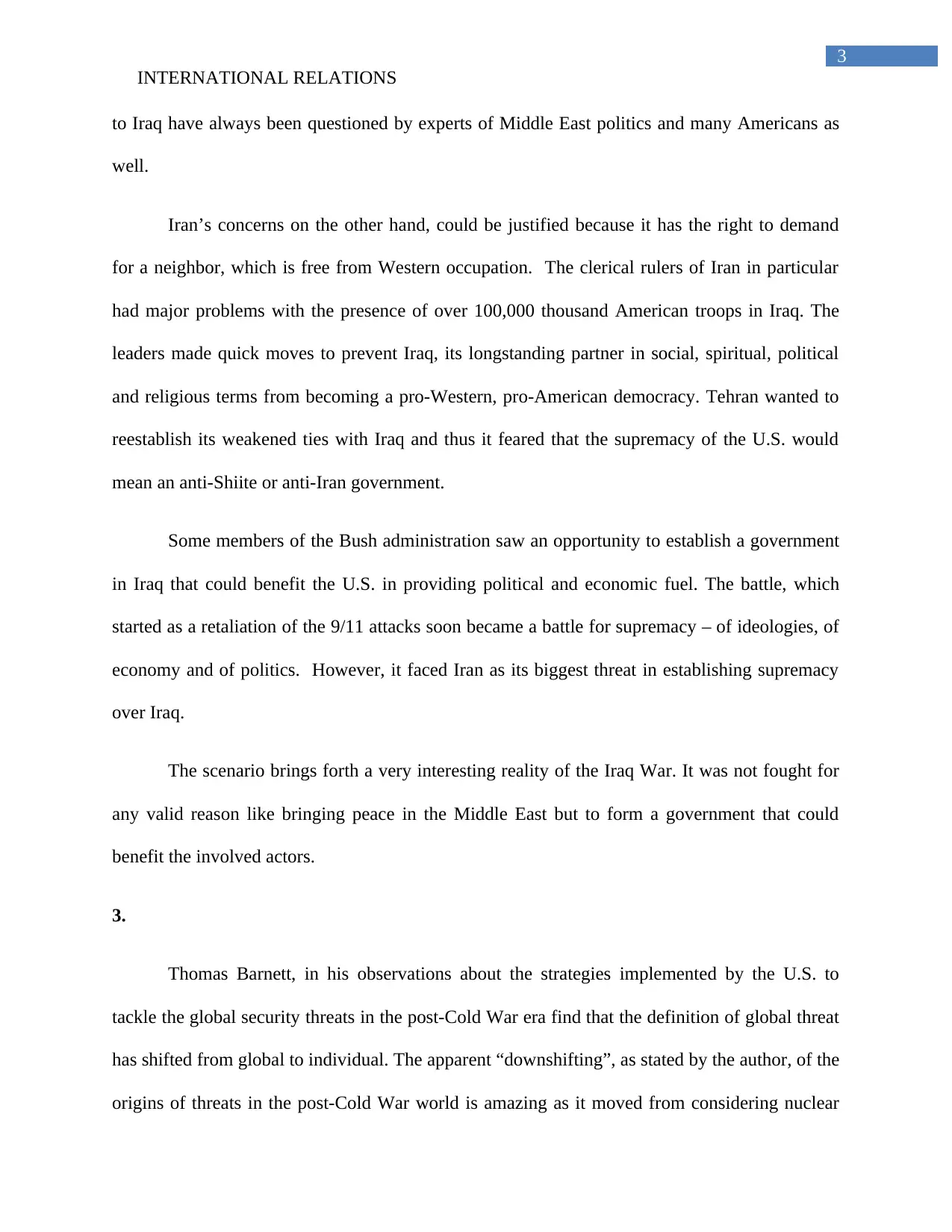
3
INTERNATIONAL RELATIONS
to Iraq have always been questioned by experts of Middle East politics and many Americans as
well.
Iran’s concerns on the other hand, could be justified because it has the right to demand
for a neighbor, which is free from Western occupation. The clerical rulers of Iran in particular
had major problems with the presence of over 100,000 thousand American troops in Iraq. The
leaders made quick moves to prevent Iraq, its longstanding partner in social, spiritual, political
and religious terms from becoming a pro-Western, pro-American democracy. Tehran wanted to
reestablish its weakened ties with Iraq and thus it feared that the supremacy of the U.S. would
mean an anti-Shiite or anti-Iran government.
Some members of the Bush administration saw an opportunity to establish a government
in Iraq that could benefit the U.S. in providing political and economic fuel. The battle, which
started as a retaliation of the 9/11 attacks soon became a battle for supremacy – of ideologies, of
economy and of politics. However, it faced Iran as its biggest threat in establishing supremacy
over Iraq.
The scenario brings forth a very interesting reality of the Iraq War. It was not fought for
any valid reason like bringing peace in the Middle East but to form a government that could
benefit the involved actors.
3.
Thomas Barnett, in his observations about the strategies implemented by the U.S. to
tackle the global security threats in the post-Cold War era find that the definition of global threat
has shifted from global to individual. The apparent “downshifting”, as stated by the author, of the
origins of threats in the post-Cold War world is amazing as it moved from considering nuclear
INTERNATIONAL RELATIONS
to Iraq have always been questioned by experts of Middle East politics and many Americans as
well.
Iran’s concerns on the other hand, could be justified because it has the right to demand
for a neighbor, which is free from Western occupation. The clerical rulers of Iran in particular
had major problems with the presence of over 100,000 thousand American troops in Iraq. The
leaders made quick moves to prevent Iraq, its longstanding partner in social, spiritual, political
and religious terms from becoming a pro-Western, pro-American democracy. Tehran wanted to
reestablish its weakened ties with Iraq and thus it feared that the supremacy of the U.S. would
mean an anti-Shiite or anti-Iran government.
Some members of the Bush administration saw an opportunity to establish a government
in Iraq that could benefit the U.S. in providing political and economic fuel. The battle, which
started as a retaliation of the 9/11 attacks soon became a battle for supremacy – of ideologies, of
economy and of politics. However, it faced Iran as its biggest threat in establishing supremacy
over Iraq.
The scenario brings forth a very interesting reality of the Iraq War. It was not fought for
any valid reason like bringing peace in the Middle East but to form a government that could
benefit the involved actors.
3.
Thomas Barnett, in his observations about the strategies implemented by the U.S. to
tackle the global security threats in the post-Cold War era find that the definition of global threat
has shifted from global to individual. The apparent “downshifting”, as stated by the author, of the
origins of threats in the post-Cold War world is amazing as it moved from considering nuclear
Paraphrase This Document
Need a fresh take? Get an instant paraphrase of this document with our AI Paraphraser
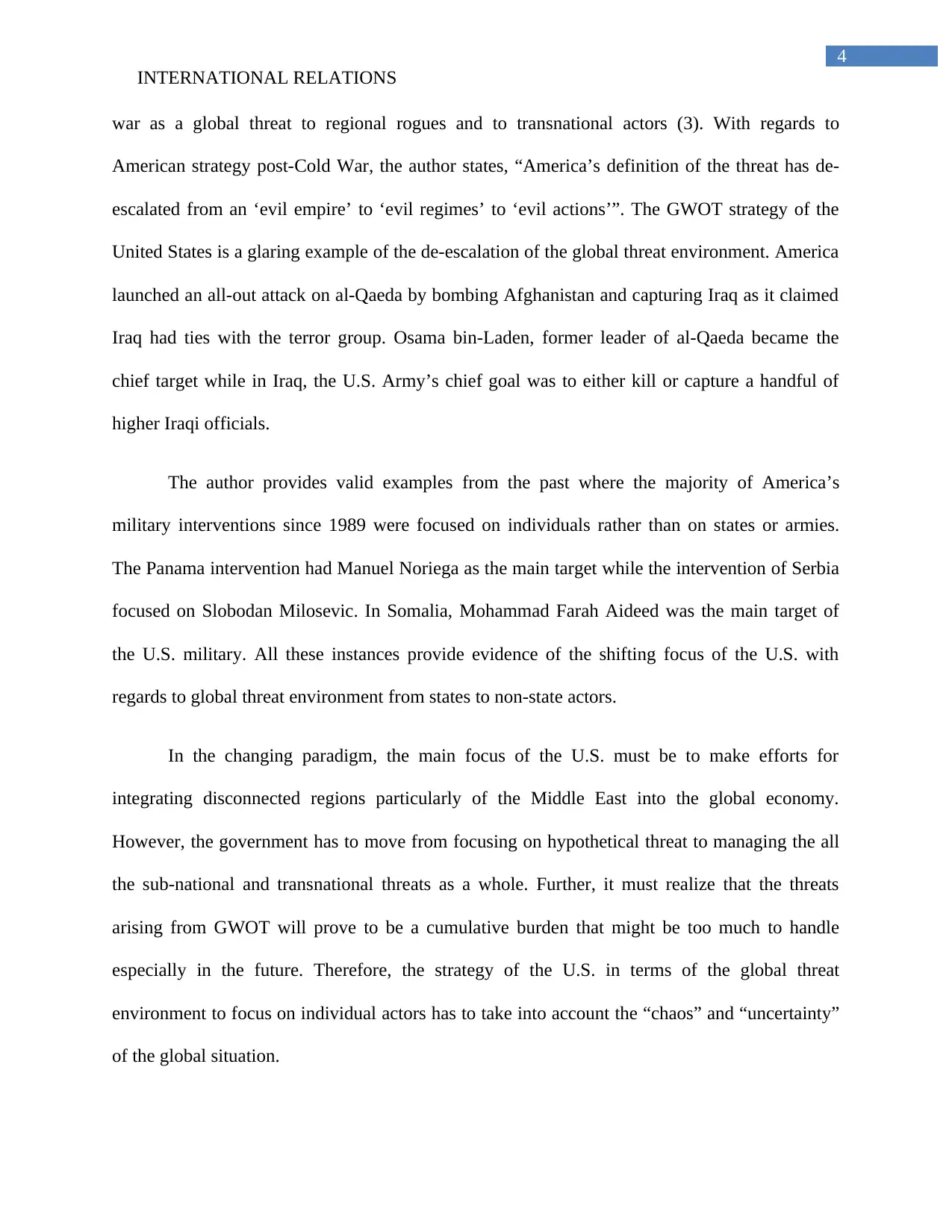
4
INTERNATIONAL RELATIONS
war as a global threat to regional rogues and to transnational actors (3). With regards to
American strategy post-Cold War, the author states, “America’s definition of the threat has de-
escalated from an ‘evil empire’ to ‘evil regimes’ to ‘evil actions’”. The GWOT strategy of the
United States is a glaring example of the de-escalation of the global threat environment. America
launched an all-out attack on al-Qaeda by bombing Afghanistan and capturing Iraq as it claimed
Iraq had ties with the terror group. Osama bin-Laden, former leader of al-Qaeda became the
chief target while in Iraq, the U.S. Army’s chief goal was to either kill or capture a handful of
higher Iraqi officials.
The author provides valid examples from the past where the majority of America’s
military interventions since 1989 were focused on individuals rather than on states or armies.
The Panama intervention had Manuel Noriega as the main target while the intervention of Serbia
focused on Slobodan Milosevic. In Somalia, Mohammad Farah Aideed was the main target of
the U.S. military. All these instances provide evidence of the shifting focus of the U.S. with
regards to global threat environment from states to non-state actors.
In the changing paradigm, the main focus of the U.S. must be to make efforts for
integrating disconnected regions particularly of the Middle East into the global economy.
However, the government has to move from focusing on hypothetical threat to managing the all
the sub-national and transnational threats as a whole. Further, it must realize that the threats
arising from GWOT will prove to be a cumulative burden that might be too much to handle
especially in the future. Therefore, the strategy of the U.S. in terms of the global threat
environment to focus on individual actors has to take into account the “chaos” and “uncertainty”
of the global situation.
INTERNATIONAL RELATIONS
war as a global threat to regional rogues and to transnational actors (3). With regards to
American strategy post-Cold War, the author states, “America’s definition of the threat has de-
escalated from an ‘evil empire’ to ‘evil regimes’ to ‘evil actions’”. The GWOT strategy of the
United States is a glaring example of the de-escalation of the global threat environment. America
launched an all-out attack on al-Qaeda by bombing Afghanistan and capturing Iraq as it claimed
Iraq had ties with the terror group. Osama bin-Laden, former leader of al-Qaeda became the
chief target while in Iraq, the U.S. Army’s chief goal was to either kill or capture a handful of
higher Iraqi officials.
The author provides valid examples from the past where the majority of America’s
military interventions since 1989 were focused on individuals rather than on states or armies.
The Panama intervention had Manuel Noriega as the main target while the intervention of Serbia
focused on Slobodan Milosevic. In Somalia, Mohammad Farah Aideed was the main target of
the U.S. military. All these instances provide evidence of the shifting focus of the U.S. with
regards to global threat environment from states to non-state actors.
In the changing paradigm, the main focus of the U.S. must be to make efforts for
integrating disconnected regions particularly of the Middle East into the global economy.
However, the government has to move from focusing on hypothetical threat to managing the all
the sub-national and transnational threats as a whole. Further, it must realize that the threats
arising from GWOT will prove to be a cumulative burden that might be too much to handle
especially in the future. Therefore, the strategy of the U.S. in terms of the global threat
environment to focus on individual actors has to take into account the “chaos” and “uncertainty”
of the global situation.
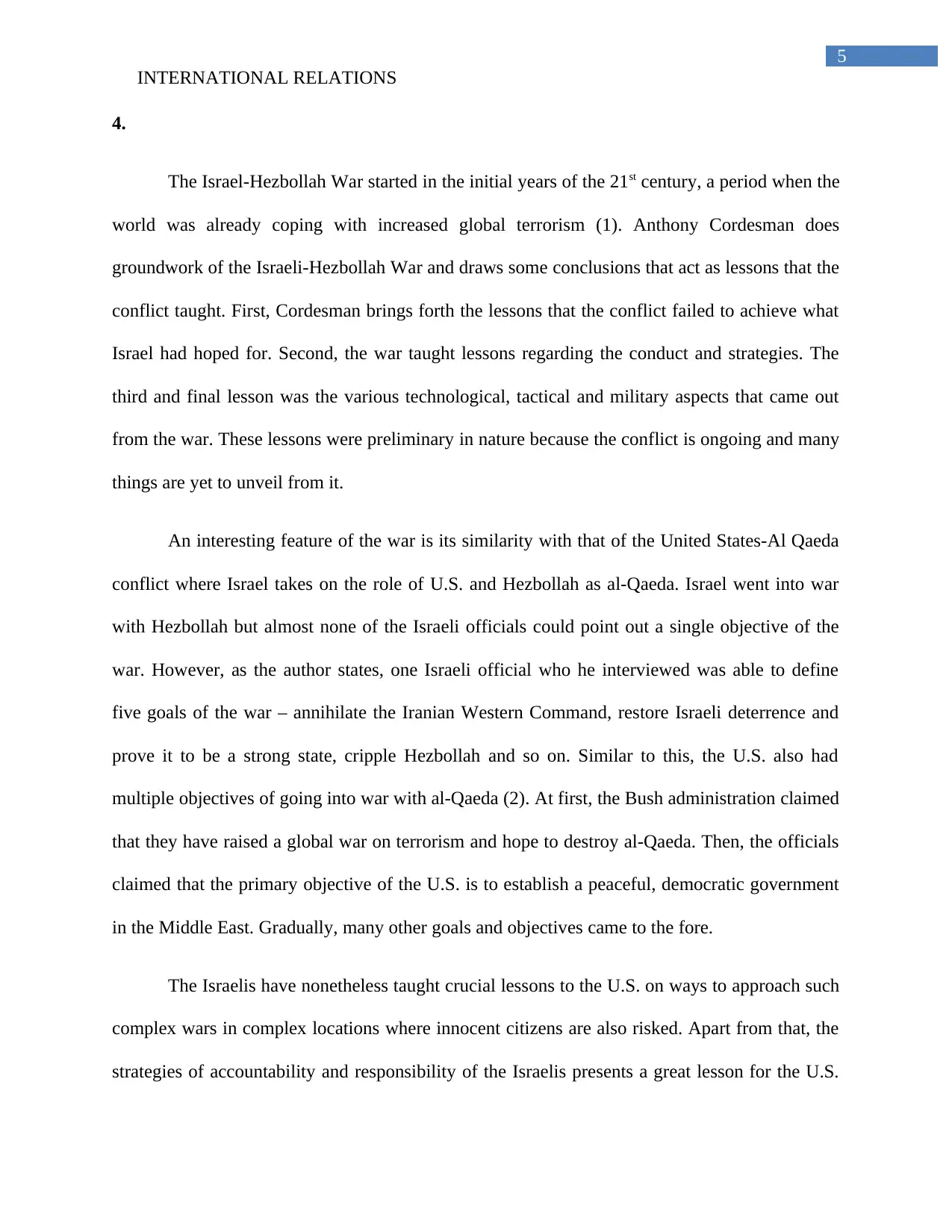
5
INTERNATIONAL RELATIONS
4.
The Israel-Hezbollah War started in the initial years of the 21st century, a period when the
world was already coping with increased global terrorism (1). Anthony Cordesman does
groundwork of the Israeli-Hezbollah War and draws some conclusions that act as lessons that the
conflict taught. First, Cordesman brings forth the lessons that the conflict failed to achieve what
Israel had hoped for. Second, the war taught lessons regarding the conduct and strategies. The
third and final lesson was the various technological, tactical and military aspects that came out
from the war. These lessons were preliminary in nature because the conflict is ongoing and many
things are yet to unveil from it.
An interesting feature of the war is its similarity with that of the United States-Al Qaeda
conflict where Israel takes on the role of U.S. and Hezbollah as al-Qaeda. Israel went into war
with Hezbollah but almost none of the Israeli officials could point out a single objective of the
war. However, as the author states, one Israeli official who he interviewed was able to define
five goals of the war – annihilate the Iranian Western Command, restore Israeli deterrence and
prove it to be a strong state, cripple Hezbollah and so on. Similar to this, the U.S. also had
multiple objectives of going into war with al-Qaeda (2). At first, the Bush administration claimed
that they have raised a global war on terrorism and hope to destroy al-Qaeda. Then, the officials
claimed that the primary objective of the U.S. is to establish a peaceful, democratic government
in the Middle East. Gradually, many other goals and objectives came to the fore.
The Israelis have nonetheless taught crucial lessons to the U.S. on ways to approach such
complex wars in complex locations where innocent citizens are also risked. Apart from that, the
strategies of accountability and responsibility of the Israelis presents a great lesson for the U.S.
INTERNATIONAL RELATIONS
4.
The Israel-Hezbollah War started in the initial years of the 21st century, a period when the
world was already coping with increased global terrorism (1). Anthony Cordesman does
groundwork of the Israeli-Hezbollah War and draws some conclusions that act as lessons that the
conflict taught. First, Cordesman brings forth the lessons that the conflict failed to achieve what
Israel had hoped for. Second, the war taught lessons regarding the conduct and strategies. The
third and final lesson was the various technological, tactical and military aspects that came out
from the war. These lessons were preliminary in nature because the conflict is ongoing and many
things are yet to unveil from it.
An interesting feature of the war is its similarity with that of the United States-Al Qaeda
conflict where Israel takes on the role of U.S. and Hezbollah as al-Qaeda. Israel went into war
with Hezbollah but almost none of the Israeli officials could point out a single objective of the
war. However, as the author states, one Israeli official who he interviewed was able to define
five goals of the war – annihilate the Iranian Western Command, restore Israeli deterrence and
prove it to be a strong state, cripple Hezbollah and so on. Similar to this, the U.S. also had
multiple objectives of going into war with al-Qaeda (2). At first, the Bush administration claimed
that they have raised a global war on terrorism and hope to destroy al-Qaeda. Then, the officials
claimed that the primary objective of the U.S. is to establish a peaceful, democratic government
in the Middle East. Gradually, many other goals and objectives came to the fore.
The Israelis have nonetheless taught crucial lessons to the U.S. on ways to approach such
complex wars in complex locations where innocent citizens are also risked. Apart from that, the
strategies of accountability and responsibility of the Israelis presents a great lesson for the U.S.
⊘ This is a preview!⊘
Do you want full access?
Subscribe today to unlock all pages.

Trusted by 1+ million students worldwide
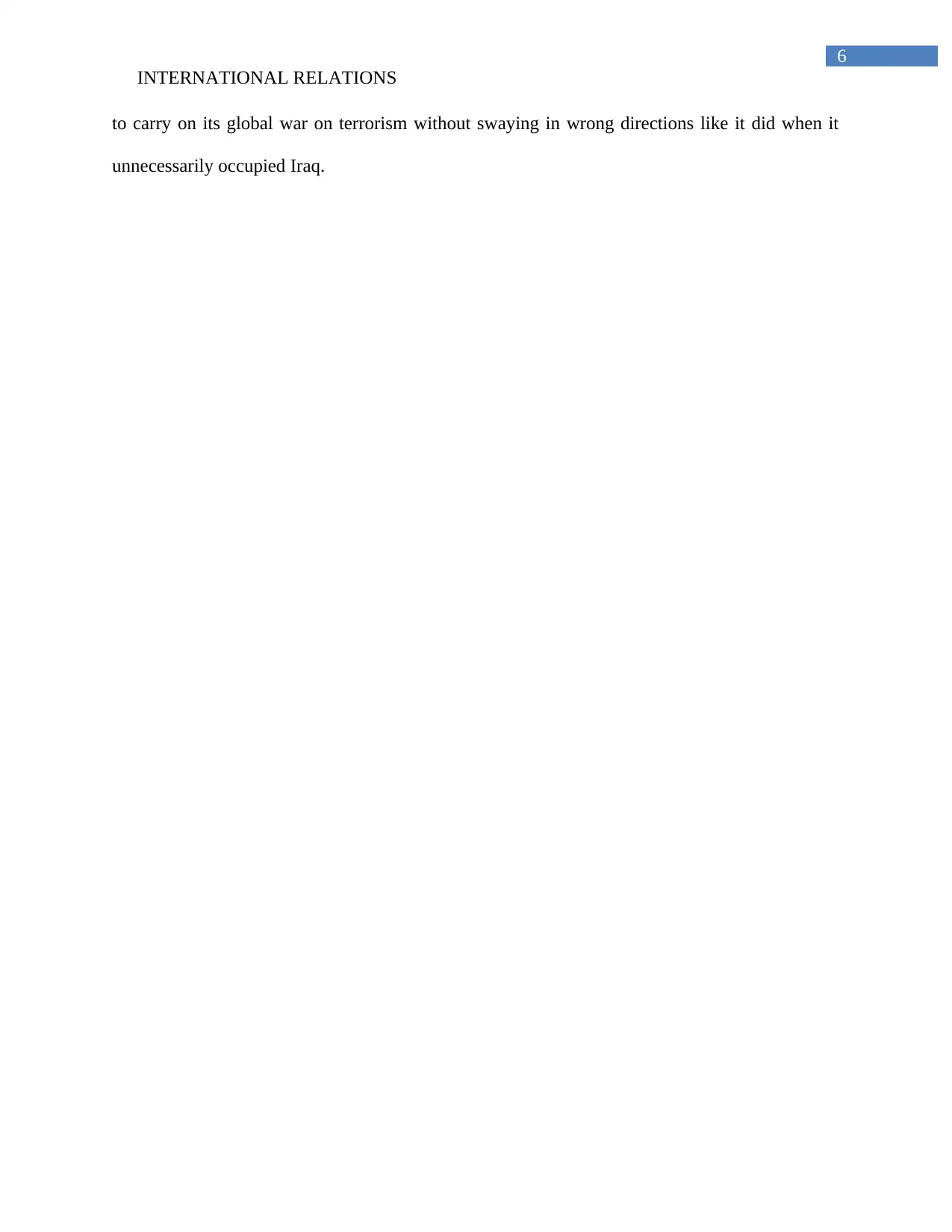
6
INTERNATIONAL RELATIONS
to carry on its global war on terrorism without swaying in wrong directions like it did when it
unnecessarily occupied Iraq.
INTERNATIONAL RELATIONS
to carry on its global war on terrorism without swaying in wrong directions like it did when it
unnecessarily occupied Iraq.
Paraphrase This Document
Need a fresh take? Get an instant paraphrase of this document with our AI Paraphraser
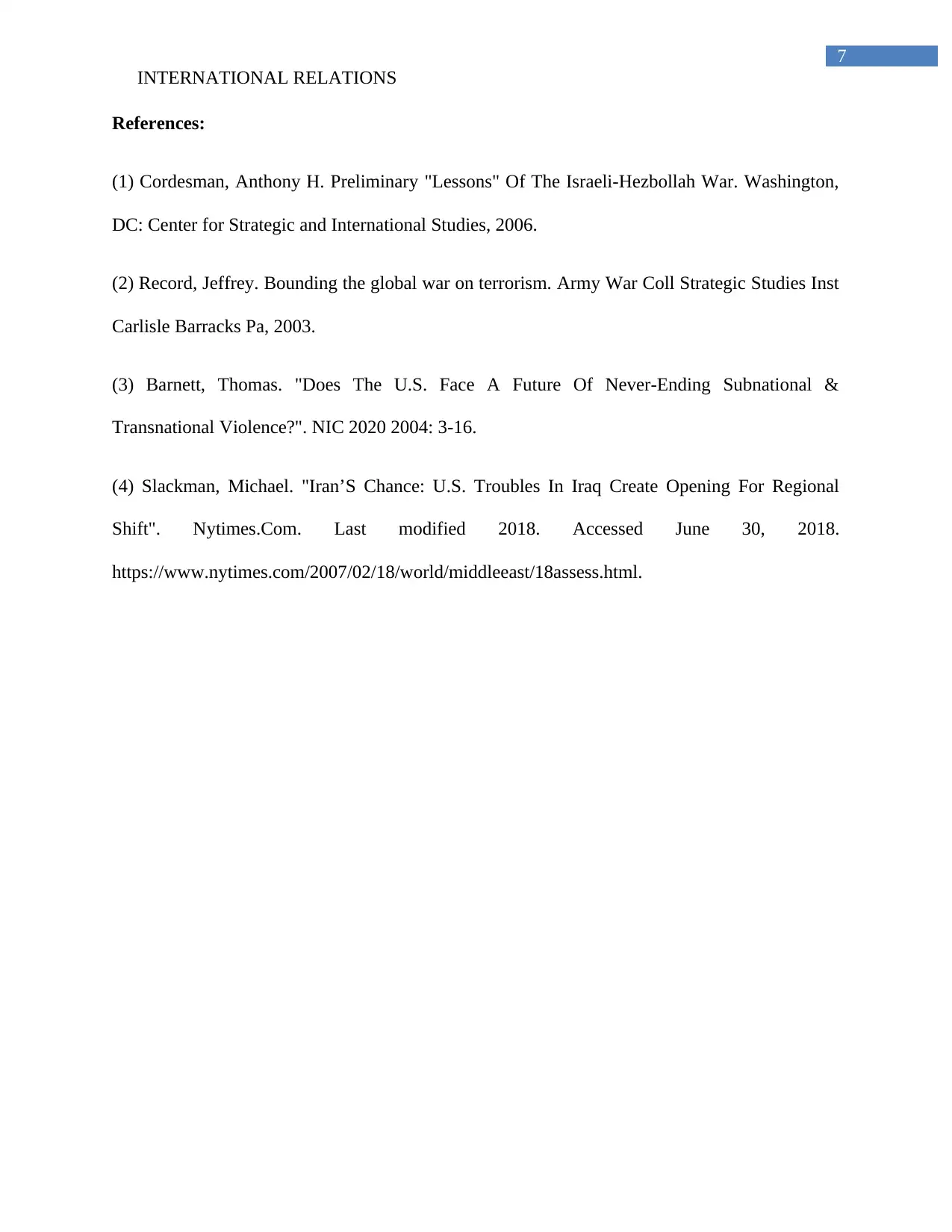
7
INTERNATIONAL RELATIONS
References:
(1) Cordesman, Anthony H. Preliminary "Lessons" Of The Israeli-Hezbollah War. Washington,
DC: Center for Strategic and International Studies, 2006.
(2) Record, Jeffrey. Bounding the global war on terrorism. Army War Coll Strategic Studies Inst
Carlisle Barracks Pa, 2003.
(3) Barnett, Thomas. "Does The U.S. Face A Future Of Never-Ending Subnational &
Transnational Violence?". NIC 2020 2004: 3-16.
(4) Slackman, Michael. "Iran’S Chance: U.S. Troubles In Iraq Create Opening For Regional
Shift". Nytimes.Com. Last modified 2018. Accessed June 30, 2018.
https://www.nytimes.com/2007/02/18/world/middleeast/18assess.html.
INTERNATIONAL RELATIONS
References:
(1) Cordesman, Anthony H. Preliminary "Lessons" Of The Israeli-Hezbollah War. Washington,
DC: Center for Strategic and International Studies, 2006.
(2) Record, Jeffrey. Bounding the global war on terrorism. Army War Coll Strategic Studies Inst
Carlisle Barracks Pa, 2003.
(3) Barnett, Thomas. "Does The U.S. Face A Future Of Never-Ending Subnational &
Transnational Violence?". NIC 2020 2004: 3-16.
(4) Slackman, Michael. "Iran’S Chance: U.S. Troubles In Iraq Create Opening For Regional
Shift". Nytimes.Com. Last modified 2018. Accessed June 30, 2018.
https://www.nytimes.com/2007/02/18/world/middleeast/18assess.html.
1 out of 8
Related Documents
Your All-in-One AI-Powered Toolkit for Academic Success.
+13062052269
info@desklib.com
Available 24*7 on WhatsApp / Email
![[object Object]](/_next/static/media/star-bottom.7253800d.svg)
Unlock your academic potential
Copyright © 2020–2026 A2Z Services. All Rights Reserved. Developed and managed by ZUCOL.




